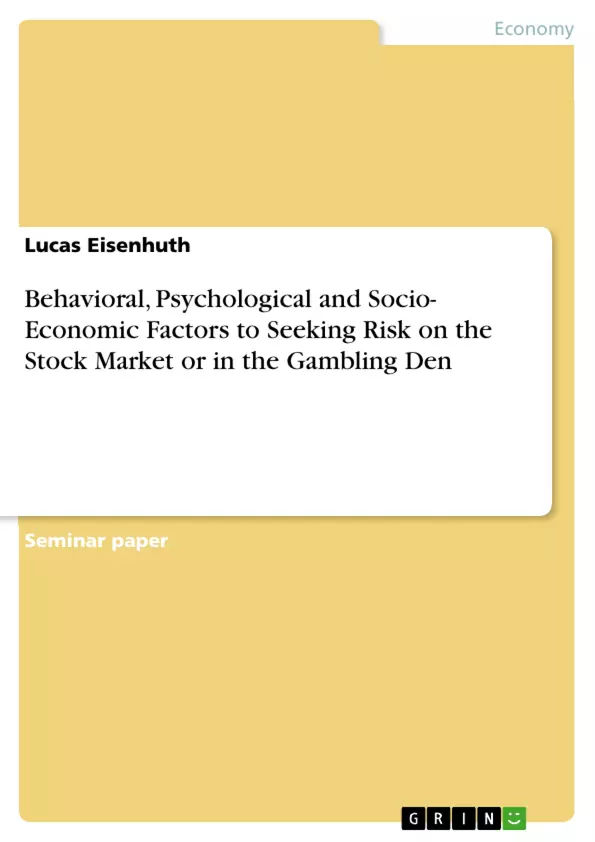What are the motivating factors for retail investors who seek excessive risk on the stock market and how do they relate to those of gambling? Who are these gamblers on the stock market in terms of socio-economic status and personalities? Are they different to those participating in other gambling markets? Which potential similarities exist between these groups? Do people participate in gambling because they prefer risky investments (sensation seeking) or are they misjudging the odds of winning (misled belief)?
To answer these questions the following paper is organized as follows. Section 2 provides the theoretical foundation for the analysis by defining gambling in a traditional sense and providing a framework for identifying gambling on the stock market. Section 3 analyses the motives for traditional gamblers and those on the stock market and links them to certain personality traits as well as socio-economic status. Section 4 briefly sums up the most important findings, compares differences and similarities between the two distinct groups and concludes.
Inhaltsverzeichnis (Table of Contents)
- Introduction
- Theoretical Framework
- Gambling in a Traditional Sense
- The Relationship of Gambling, Financial Speculation and Investing
- Gambling on the Stock Market
- A critical Analysis of People's Motives for Engaging in Gambling traditionally and on the stock market and their Demographics
- Framework of the Analysis
- Motivational Factors for participating in Traditional Gambling
- Socio-economic Status and Personality Traits of the Prototypical Gambler
- Motivational Factors for participating in Gambling on the Stock Market
- Overconfidence
- Recreation or leisure Gambling
- Sensation Seeking
- Socio-economic Status and Personality Traits of Stock Market Gamblers
- Conclusion
Zielsetzung und Themenschwerpunkte (Objectives and Key Themes)
This seminar paper aims to explore the motivations and demographic characteristics of retail investors who engage in risky behavior on the stock market, comparing their behaviors to traditional gambling activities. The paper seeks to understand why some retail investors participate in stock market gambling, how their motivations relate to those of traditional gamblers, and whether their socio-economic status and personality traits differ from those of traditional gamblers.
- Motivational factors for engaging in stock market gambling and their relation to traditional gambling.
- Socio-economic and personality characteristics of stock market gamblers compared to traditional gamblers.
- The influence of sensation seeking and belief in winning odds on gambling participation.
- Understanding the economic implications of retail investors engaging in gambling-like behavior on the stock market.
- The relevance of this research to household finance and retirement planning.
Zusammenfassung der Kapitel (Chapter Summaries)
The introduction examines the rise and fall of the GameStop stock, highlighting the role of retail investors in influencing financial markets. It discusses the social costs of traditional gambling and the growing interest in understanding the motivations of retail investors who engage in stock market gambling.
The theoretical framework section defines gambling in a traditional sense, exploring various types of gambling. It outlines the relationship between traditional gambling, financial speculation, and investing, culminating in a definition of gambling on the stock market.
Chapter 3 delves into the motivations of traditional gamblers and those who engage in stock market gambling. It examines the socio-economic status and personality traits associated with each group, exploring potential similarities and differences. The chapter also considers the role of overconfidence, recreation, and sensation seeking in driving participation in both types of gambling.
Schlüsselwörter (Keywords)
The key focus of this seminar paper revolves around the behavior of retail investors, particularly their motivations and characteristics when engaging in risky investments, including stock market gambling and traditional gambling. This includes exploring themes of overconfidence, sensation seeking, and the influence of socio-economic status and personality traits on investment decisions. Other important concepts include traditional gambling activities, such as casino games, sports bets, and lotteries, and the comparison of these with risky stock market investments. The study explores the relationship between gambling behavior and financial markets, highlighting the potential implications for household finance and retirement planning.
Frequently Asked Questions
What motivates retail investors to take excessive risks on the stock market?
Key motivating factors include overconfidence, sensation seeking, and the use of the stock market for recreation or leisure gambling.
How is stock market gambling defined in this context?
Stock market gambling refers to financial speculation where the motive is similar to traditional gambling, often characterized by high risk and a focus on short-term excitement rather than long-term investment.
Are there similarities between stock market gamblers and traditional gamblers?
Yes, the research compares both groups regarding their socio-economic status and personality traits, finding shared characteristics like a high preference for sensation seeking.
What role does overconfidence play in risky investment behavior?
Overconfidence leads investors to overestimate their knowledge and ability to predict market movements, which often results in misjudging the actual odds of winning.
Why is this research relevant for retirement planning?
Understanding gambling-like behavior on the stock market is crucial for household finance, as excessive risk-taking can significantly jeopardize long-term financial security and retirement funds.
What was the GameStop stock phenomenon an example of?
The GameStop case serves as an example of how retail investors can influence markets through collective, high-risk behavior driven by social and psychological motives.
- Arbeit zitieren
- Lucas Eisenhuth (Autor:in), 2022, Behavioral, Psychological and Socio- Economic Factors to Seeking Risk on the Stock Market or in the Gambling Den, München, GRIN Verlag, https://www.grin.com/document/1170858



